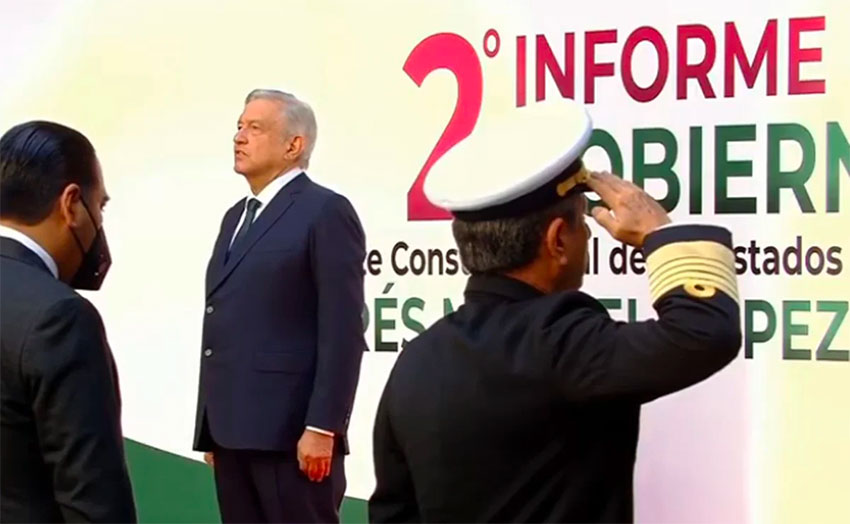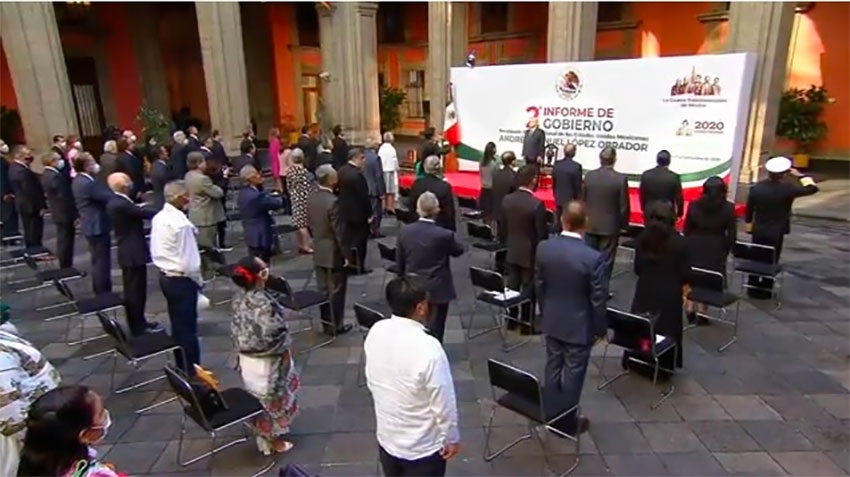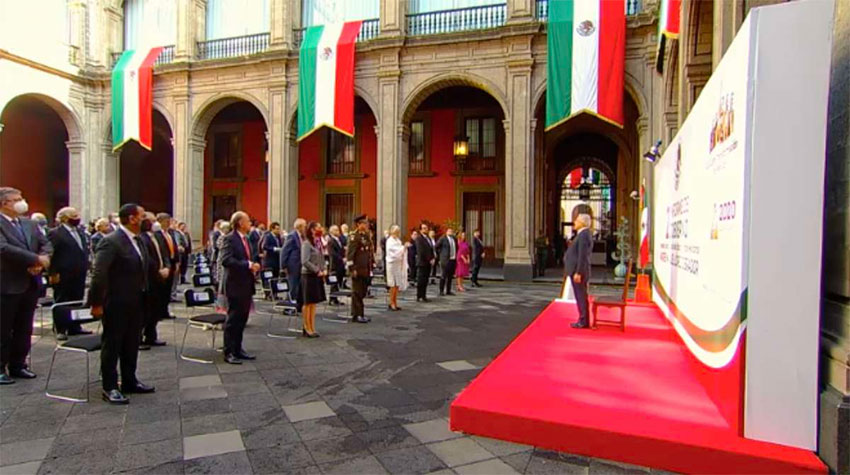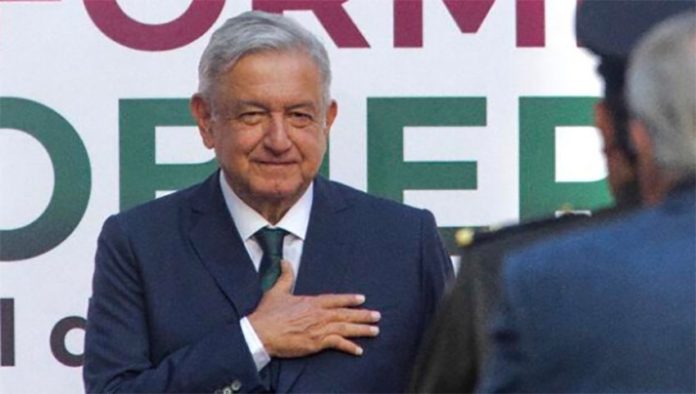The foundations for the “Mexico of the future” will have been laid by December 1, President López Obrador declared Tuesday in his second annual report to the nation.
The president delivered an almost hour-long address at the National Palace, highlighting his administration’s achievements in combating corruption, responding to the coronavirus pandemic, delivering welfare programs, reaching a new trade deal with the United States and Canada, taking care of the environment, building infrastructure projects, reducing crime and improving the justice system.
López Obrador asserted that that he has fulfilled 95 of 100 commitments he made on December 1, 2018 – the day he took office – and declared that his government has implemented a new economic policy that benefits the ordinary people of Mexico rather than the nation’s wealthiest.
Speaking to a crowd of about 70 people including government officials and business leaders, the president said his government “will not be remembered for being corrupt.”
“Our main legacy will be the purification of public life in Mexico and [in this] we’re making progress.”
Without offering specific details, he claimed that “by not allowing corruption,” the government has generated savings of approximately 560 billion pesos (US $25.7 billion).
“At the worst time,” López Obrador said referring to the dual economic and health crisis precipitated by the coronavirus pandemic, “we have the best government.”
He highlighted that his administration has implemented a policy of “republican austerity,” declaring that “there are no longer luxuries in the government.”
The savings generated have been allocated to programs designed to improve the well-being of the people, he said.
Although Mexico has been one of the worst affected countries by the coronavirus, López Obrador praised the government’s response, particularly highlighting efforts to increase the health system’s capacity to respond.
Mexico will have a better health system at the end of the pandemic than it had at the start, he said, while also touting the plan to manufacture a coronavirus vaccine here and subsequently inoculate all citizens free of charge.

After acknowledging that the high prevalence of diet-related chronic diseases contributed to making the impact of the pandemic more severe and urging citizens to eat a healthy diet and exercise, the president turned his focus to the government’s economic response to the crisis, which has been widely described as inadequate.
He highlighted that his administration has targeted financial aid at the country’s poorest and most vulnerable rather than large companies and banks.
“For the good of all, the people are bailed out first,” López Obrador said, explaining that seven in 10 families are receiving some kind of financial support from the government. He added that 100% of indigenous people and the nation’s poorest are being supported by his administration.
It’s a “badge of pride” to help so many people, the president said after brushing off the private sector’s criticism of his economic response to the pandemic, which only offered small loans to business owners.
Welfare payments to seniors and children with disabilities are “not an expense but an investment, not a handout [but] justice,” López Obrador said, adding that his government is guaranteeing young people’s “right” to education and employment through the delivery of scholarships to students and the establishment of a youth apprenticeship scheme.
“We won’t allow young people to be roped into crime,” he said. “With them we’re building the future.”
López Obrador also highlighted the support his government is providing to farmers and fishermen, including the delivery of free fertilizer and the establishment of guaranteed prices for five agricultural products.
Referring to the government’s broad support for the nation’s most vulnerable, the president said that Mexico now serves as “a global example of how to make ‘progress with justice’ a reality.“
He praised migrants for increasing their transfer of remittances to family members in Mexico during the current difficult economic times and asserted that crime hasn’t risen during the pandemic.
Economically speaking, the worst impact of the pandemic has passed and a V-shaped recovery is underway, López Obrador said, highlighting that 93,000 jobs were created in August and that the peso and Mexican oil price have both recently strengthened.
Despite the near 20% slump in GDP in the second quarter, the president said that the pandemic has caused less damage here than in many other countries. He said that most employers didn’t lay off workers, noting that while 1 million formal sector jobs were lost, the vast majority were maintained.
López Obrador noted that Mexico was appointed to the United Nations Security Council for the 2021-22 sitting period, asserting that its bid was strongly supported while neglecting to mention that it was unopposed in its candidacy to become the new representative for Latin America and the Caribbean.

Turning to domestic issues, the president reiterated his pledge not to increase gasoline and electricity prices during his six-year term and claimed that his administration is a champion of the environment.
He stressed that the government hasn’t allowed fracking or the planting of genetically-modified corn and asserted that it is taking care of the nation’s water resources. Not a single new mining concession has been granted on his watch, López Obrador said, whereas the previous five governments granted 118 million hectares of land to mining companies.
“This devastating sell-out is now over,” he said.
López Obrador focused on the benefits his government’s key infrastructure projects will bring, rather than the environmental concerns that have been raised about them, observing that the construction of a new airport north of Mexico City, a new refinery on the Tabasco coast, the Maya Train railroad and the Isthmus of Tehuantepec trade corridor will generate 150,000 jobs by the end of the year.
With regard to security, the government is addressing the root causes of crime such as poverty and unemployment and making a particular effort to avoid young vulnerable people being recruited by crime gangs, the president said.
Compared to November 2018, the month before he took office, the incidence of most crimes including kidnappings, femicides, robberies and vehicle theft has declined, the president said before acknowledging that homicides and extortion have increased.
“Organized crime is no longer in charge like before. … There are no longer officials like [Genaro] García Luna in the government,” he said, referring to former president Felipe Calderón’s security minister who is awaiting trial in the United States on charges he colluded with and accepted bribes from the Sinaloa Cartel.
López Obrador also said that his government has kept its promise to make the country’s justice institutions fully independent.
The Attorney General’s Office (FGR) and the judicial system now act with “complete autonomy,” he said, charging that they formerly took orders from the sitting president.
The executive is no longer the “power of powers,” the president said before noting that Attorney General Alejandro Gertz Manero and Supreme Court Chief Justice Arturo Zaldívar declined their invitations to attend today’s address.
“In other times, this didn’t happen,” López Obrador said, adding that the FGR has complete freedom to investigate past presidents and other officials for alleged wrongdoing if it sees fit to do so.
If a majority of people vote for past presidents to be prosecuted at a proposed referendum, the president said that he will respect the result even though he doesn’t support bringing them to justice himself.

“In a democracy, the people decide,” he said.
Approaching the conclusion of his address, López Obrador made a remark reminiscent of assertions made by his counterpart in the United States, claiming that no president since revolutionary hero Francisco I. Madero has faced so many attacks.
The president charged that “the conservatives,” a term he uses frequently to describe members of past governments and his current political opponents, “are angry because there is no longer corruption and they’ve lost the privileges” they once enjoyed.
Undeterred by their opposition, the government is continuing to carry out the “fourth transformation” of Mexico after independence from Spain, the 19th century liberal reform known as La Reforma and the Mexican Revolution, López Obrador said.
“I won’t fail the people of Mexico,” he proclaimed.
“… The new economic policy based on morality, austerity and development with progress is underway. The commitment to finish laying the groundwork for the Mexico of the future by December 1, when we’ll complete two years of government, still stands,” López Obrador said.
“Once the foundations are built, the only task left will be to complete the project of transformation and to continue governing with rectitude and love for the people in order to have their support always.”
Mexico News Daily
